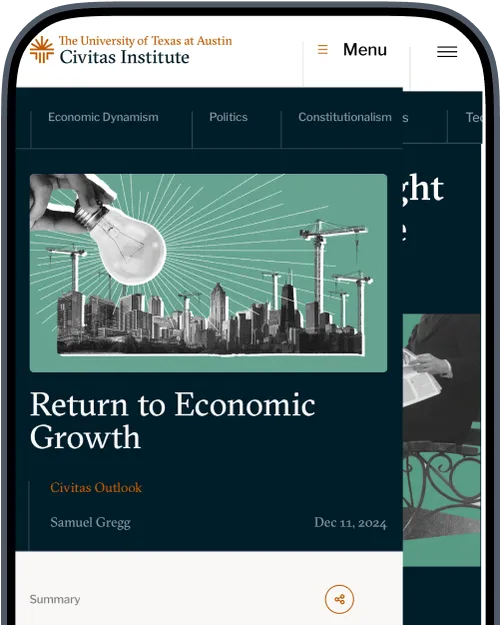
Causes Tending to Undermine a Democratic Republic
Commentary on de Tocqueville: Vol. One, Part Two, Chapter Nine
It is widely acknowledged that Democracy in America, written in 1835 and 1840, is the greatest book on that topic—a period of America long gone and never to return. De Tocqueville offers an optimistic chapter describing the forces working to preserve a democratic republic. Conjoining those two words obscures the traditional philosophical opposition between republics and democracies. In so doing, De Tocqueville offers several explanations that, while accurate for his time, are as dead as a dodo bird in ours.
His first explanation is that “The Americans have no neighbors and consequently no great wars,” except, of course, with themselves (the Civil War of 1861-1865 was at the time the bloodiest and most sophisticated war fought anywhere in the world). We still have quiet borders with our northern and southern neighbors (putting aside the problem of illegal immigration). But today, new technologies that span oceans call for military interactions with countless nations, both friend and foe—China, Germany, Iran, Iraq, Israel, Japan, North Korea, Russia, Spain, Taiwan, Ukraine, the United Kingdom, and many others. Our current military budget, foreign policy, defense capabilities, intelligence sources, and foreign aid programs never crossed De Tocqueville’s mind. But to read him as a blind isolationist would draw exactly the wrong inference. Today, he would know that the question is not only whether to interact with these formidable world powers but also how to do so. Do we sign bilateral or multilateral treaties? Can we continue to follow a constitutional system that requires, except in emergencies, the Congress to declare war before the President as commander-in-chief can intervene in Kosovo or Libya? These all present tough issues. And if De Tocqueville was right to attack General Andrew Jackson when he ascended to the presidency, should we say the same about Dwight Eisenhower? Don’t blame De Tocqueville for not seeing the future. Don’t rely on him as if he did.
Second, De Tocqueville spoke of the advantages of having a small national capital, which prevents a disproportionate concentration of power at the center that would regrettably displace the “great assemblies” in small towns and reduce the key role of citizen participation in direct democracy. He even notes with evident uneasiness that cities like Philadelphia (then populated by 161,000 inhabitants) and New York (then 202,000) could be the source not only of disagreement but potentially of race riots.
Those days are gone forever. When De Tocqueville wrote, the population in the United States was under 15 million people, just before the new waves of immigration reached our shores. Today, the population of the United States is over 336 million people. New York City is close to 8 million, and Philadelphia has about 1.5 million. Those long-term population increases do not allow traditional institutions to scale up without some fundamental changes in their character. The town model cannot work, so some variation on the square/cube law takes over—any viable state must cube the size of its infrastructure in order to double the size of its operations. Town meetings are for school boards, not climate control or interstate transportation.
Yet more than size is at stake. For the first, roughly speaking, 125-150 years under the 1787 Constitution, the philosophy of government at the federal level changed radically. The classical liberal model that speaks of the control of force, fraud and monopoly was no longer at the fore. Now, a much broader conception of government power uses administrative expertise to implement complex regulatory schemes that are supposed to reflect informed democratic preferences. Woodrow Wilson’s administration ushered in the federal income tax, the Federal Reserve Board and the Federal Trade Commission, the expansion of antitrust laws, the direct election of Senators, and women’s suffrage. Together, these composed the first stage of expanding state power, followed by Franklin Roosevelt’s New Deal and Lyndon Johnson’s Great Society. These activities undercut the restrictions on state power imposed by the principles of separation of powers and checks and balances. The New Deal saw the rise of the alphabet agencies—the Agricultural Adjustment Administration, the National Labor Relations Board, the Civil Aeronautics Authority, the Interstate Commerce Commission, and many more. The Great Society added civil rights, health care, and environmental protection, bringing more power to Washington, which today may be somewhat curbed by the Roberts Court’s controversial attack on judicial deference to the expansive actions of the administrative state.
De Tocqueville may not have approved of all these changes had he foreseen them. But, if alive today, he would recognize that there is no turning back to the simpler world of 1835. And as the final irony, like De Tocqueville, we have no open spaces in which to move and hide. So our challenge in this brave new world is to maintain levels of freedom and prosperity that De Tocqueville could not have imagined—or understood.
This essay was originally published at Constituting America
Richard A. Epstein is the inaugural Laurence A. Tisch Professor of Law at NYU School of Law, where he serves as a Director of the Classical Liberal Institute, which he helped found in 2013. He has served as the Peter and Kirstin Bedford Senior Fellow at the Hoover Institution since 2000. Epstein is also the James Parker Hall Distinguished Service Professor of Law Emeritus and a senior lecturer at the University of Chicago.
Constitutionalism

Trump's Immigration Agenda and the Constitution
The Trump administration may be able to resort to new, untried legal tactics to overcome resistance.

The Case Against Birthright Citizenship
No one at the time or now has advanced a coherent explanation as to why birthright citizenship is desirable as a matter of principle.
.png)





.webp)


